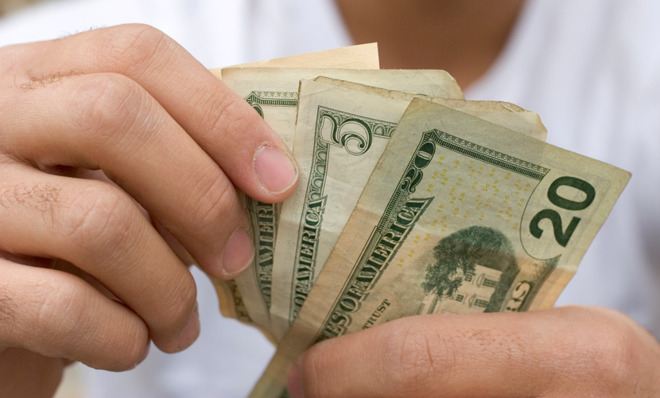The secret logic of drug deals
These six types of customers should watch out

A free daily email with the biggest news stories of the day – and the best features from TheWeek.com
You are now subscribed
Your newsletter sign-up was successful
Get ripped off in a drug deal, and there's not a whole lot you can do. It's not like you can complain to the Better Business Bureau or leave your dealer a lousy review on Yelp. As one dealer puts it, "I mean, what you gonna do? What, you gonna go up to the police and say, 'Hey man, he skeeted me out of an ounce'? Hell no."
With customers having almost no recourse except for violence, drug dealers can rip off pretty much anyone they want, either overcharging for their goods or handing over less product, or a lower quality one, than what's owed. Combine the slim chances of getting punished with a desire to maximize profits, say criminologists Scott Jacques, Andrea Allen, and Richard Wright, and dealers have good reason to cheat customers. "Obviously, charging more or providing less quantity or quality is prudent, all else equal," they say.
And yet, dealers don't go ripping off every customer. Some get exactly what they pay for, at the going market rate. So who do dealers rip off and why? To find out, Jacques, Allen, and Wright hit the streets of St. Louis and talked to more than two dozen dealers and low-level suppliers working in various neighborhoods. The researchers were able to identify six types of customers that were more likely to get a raw deal. In each case, dealers had a rationale for cheating that type of customer. It was almost always a decision meant to maximize benefit and minimize cost.
The Week
Escape your echo chamber. Get the facts behind the news, plus analysis from multiple perspectives.

Sign up for The Week's Free Newsletters
From our morning news briefing to a weekly Good News Newsletter, get the best of The Week delivered directly to your inbox.
From our morning news briefing to a weekly Good News Newsletter, get the best of The Week delivered directly to your inbox.
"After all, dealers are like other businesspersons in that they have a concern for repeat business, which can be lost if customers feel they are not being treated fairly," the researchers write. "Extra money is worth the risk of being retaliated against or loss of business in the long term."
Who gets ripped off and why?
First-time or irregular customers: Regular and repeat customers are a source of stability in a chaotic business, and dealers said they recognized that benefit and dealt fairly with them. Irregular buyers don't have that going for them, though, so dealers often cheat customers that are unlikely to become regulars, securing a short-term benefit when a long-term one probably won't materialize. As a dealer who goes by "Balla" said, "when you come to me and you don't spend with me a lot you're not gonna get as much as the motherfucker that's gonna spend with me."
Customers who "come short," i.e. asking for more drugs than they have money to purchase: Cheating them is a way to offset the hassle of having to negotiate with them, and as a motivation to bring the full amount of money next time.
A free daily email with the biggest news stories of the day – and the best features from TheWeek.com
Customers who don't know the local prices: Frequent targets because they don't even notice they're getting cheated. Dealer "Dirty" told the researchers he had a frequent customer like this: "I had this one young guy who gave me $10 but I gave him like $5 worth of weed. He didn't have no problem. He kept coming back; he didn't even know." That's free money, with little or no risk, unless the buyer suddenly wises up.
"Soft targets": Dealer "Juice" put it this way: "Some customers just take what you give them." They're unwilling or unable to do anything about being mistreated, so dealers will worry less about losing repeat business and instead focus on the immediate profits that can be gained risk-free.
"Wrongdoers": Not all rip-offs are financially motivated. Some are retaliation for a dealer that's been slighted. Dealer "Lil Homie" had a customer that he initially treated fairly, he told the researchers, but when the customer repeatedly complained that he was being cheated, Homie took offense and got even by doing exactly what he was being accused of. "I had one dude who was always complaining about the price, man. He used to piss me off…And I turned 'round and charged him double because I told him the prices went up. Pissed him off."
Addicts: The researchers found that more-desperate drug addicts were the group most likely to be cheated because their addiction puts them in a poor position to bargain or complain, even when they're mistreated. Some dealers also saw cheating junkies as a strike against the "lowest of the low" on behalf of the neighborhood. Dealer "Big Mike" explained, "If you gonna work and you got a job, then you working to supply your habit. I won't call you no crack head, you just got a drug problem. But when you out there and you got to rob and steal and all of that shit stuff, that's a crack head — I treat them differently."
From all of this, Jacques, Allen, and Wright came up with a list of tips for buyers looking to protect themselves from getting cheated. Not just people scoring drugs, either, but consumers in more upscale, legal markets, too. Just as drug dealers make logical economic decisions like legit businesses, the researchers remind us that "rip-offs are not confined to black market trade. Legal companies and salespersons from Wall Street to Main Street engage in their own brand of deceptive business practices."
(1) Portray yourself to the seller as likely to make further purchases if satisfied.
(2) Buy from the same seller on a regular basis.
(3) Become acquainted with the seller to the greatest degree possible.
(4) Bring the dollar amount specified by the seller.
(5) Be informed about the going market rate: price per unit of a particular grade.
(6) Do not offend the seller.
(7) Present yourself as willing to take your business elsewhere, complain, or retaliate.
(8) Do not be an addict.
-
 What to watch out for at the Winter Olympics
What to watch out for at the Winter OlympicsThe Explainer Family dynasties, Ice agents and unlikely heroes are expected at the tournament
-
 Properties of the week: houses near spectacular coastal walks
Properties of the week: houses near spectacular coastal walksThe Week Recommends Featuring homes in Cornwall, Devon and Northumberland
-
 Will Beatrice and Eugenie be dragged into the Epstein scandal?
Will Beatrice and Eugenie be dragged into the Epstein scandal?Talking Point The latest slew of embarrassing emails from Fergie to the notorious sex offender have put her daughters in a deeply uncomfortable position